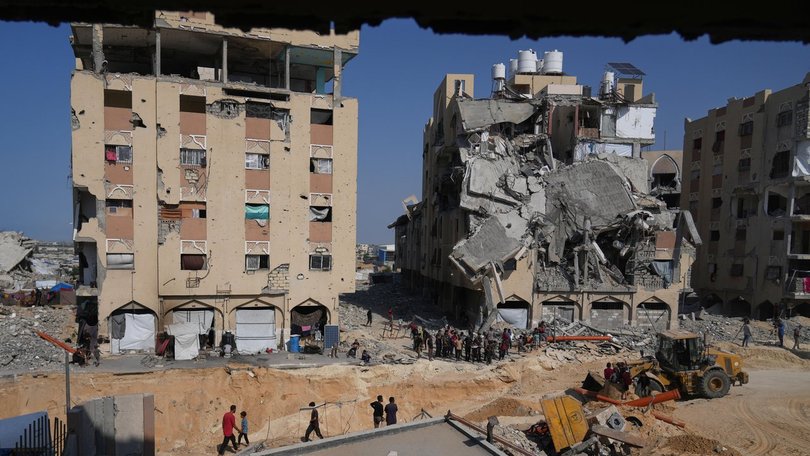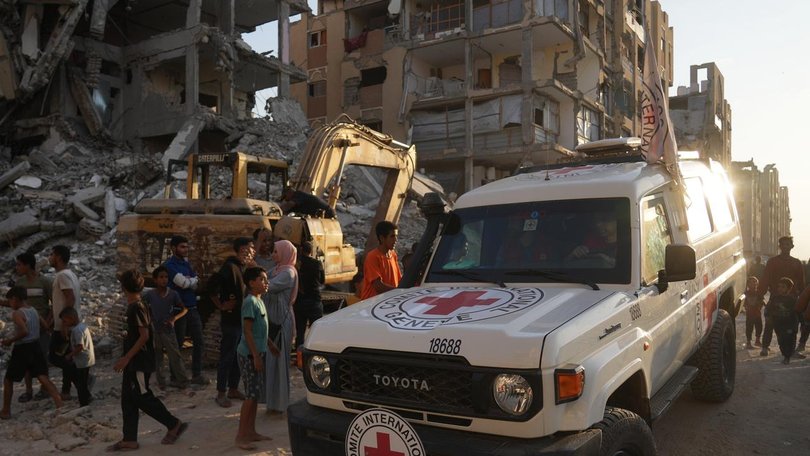Israeli strikes in Gaza shatter fragile truce as Netanyahu vows forceful response to Hamas attacks
The Israeli military says the ceasefire in Gaza has resumed after an attack that killed two of its soldiers and prompted a wave of airstrikes that killed 26 people.
The Israeli military says the ceasefire in Gaza has resumed after an attack that killed two of its soldiers and prompted a wave of airstrikes that killed 26 people, in the most serious test yet of this month’s US-brokered truce.
Aid into the enclave was set to resume on Monday following US pressure, an Israeli security source said, shortly after Israel announced a halt in supplies in response to what it said was a “blatant” violation by Hamas of the truce.
The Israeli strikes killed at least 26 people in Gaza, including at least one woman and one child, according to local residents and health authorities.
Sign up to The Nightly's newsletters.
Get the first look at the digital newspaper, curated daily stories and breaking headlines delivered to your inbox.
By continuing you agree to our Terms and Privacy Policy.“In response to Hamas’ blatant violation of the ceasefire agreement this morning, the IDF struck dozens of Hamas terror targets across Gaza,” the IDF said.
“The IDF has begun the renewed enforcement of the ceasefire, in line with the terms of the agreement. The IDF will continue to uphold the ceasefire agreement and will respond firmly to any violation of it,” a second social media statement said.
US President Donald Trump’s envoy Steve Witkoff and son-in-law Jared Kushner were expected to travel to Israel on Monday, an Israeli official and a US official said.
The Israeli military said it struck Hamas targets across the enclave, including field commanders, gunmen, a tunnel and weapons depots, after militants launched an anti-tank missile and fired on its troops, killing the soldiers.
At least one strike hit a former school sheltering displaced people in the area of Nuseirat, residents said.
The armed wing of Hamas said it remained committed to the ceasefire agreement, was unaware of clashes in Rafah, and had not been in contact with groups there since March.
Israeli Prime Minister Benjamin Netanyahu said he had ordered the military to respond forcefully to what he described as Hamas’ violations of the ceasefire.
An Israeli security official had said that the transfer of aid into Gaza had been halted following what he described as Hamas’ blatant violation of the ceasefire agreement. But, after US pressure, another Israeli security official said that aid would resume on Monday.
Fearing the truce may collapse, some Palestinians rushed to buy goods from a main market in Nuseirat and families fled their homes in Khan Younis further south, after airstrikes hit nearby.

The strikes were reminiscent of Israel’s response to what it viewed as serious violations of its ceasefire with Hamas’ Lebanese ally Hezbollah in late 2024, less than a week after it came into effect and after days of mutual accusations of truce breaches, though that ceasefire has since largely held.
But formidable obstacles remain in the way of a durable peace in Gaza, where a ceasefire collapsed in March after nearly two months of relative calm when Israel unleashed a barrage of airstrikes.
The new ceasefire took effect on October 10, halting two years of war, but the Israeli government and Hamas have been accusing each other of violations of the ceasefire for days.
Defense Minister Israel Katz said the “yellow line” to where Israeli forces had pulled back under the ceasefire agreement would be physically marked and that any violation of the ceasefire or attempt to cross the line would be met with fire.
Hamas detailed what it said was a series of violations by Israel that it says have left 46 people dead and stopped essential supplies from reaching the enclave.

On Saturday, Israel said the Rafah border crossing between Gaza and Egypt, which had been expected to be reopened this week, would remain closed and that its reopening would depend on Hamas fulfilling its obligations under the ceasefire.
Israel says Hamas is being too slow in handing over bodies of deceased hostages. Hamas last week released all 20 living hostages it had been holding and in the following days has handed over 12 of the 28 dead captives.
The group says it has no interest in keeping the bodies of remaining hostages and that special equipment is needed to recover corpses buried under rubble.
The Rafah crossing has largely been shut since May 2024. The ceasefire deal also includes the ramping up of aid to Gaza, where hundreds of thousands of people were determined in August to be affected by famine, according to the IPC global hunger monitor.

